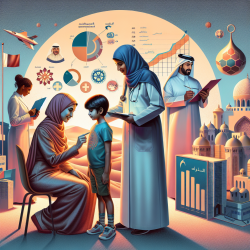Introduction
In the realm of speech language pathology and child development, understanding the socio-political and cultural contexts in which children grow is crucial for creating effective interventions. The research article "Gendered Citizenship, Inequality, and Well-Being: The Experience of Cross-National Families in Qatar during the Gulf Cooperation Council Crisis (2017–2021)" provides valuable insights into the challenges faced by cross-national families in Qatar. This blog post explores how practitioners can leverage these insights to enhance their practice and advocate for better outcomes for children.
Understanding the Impact of Gendered Citizenship
The study highlights the profound impact of gendered citizenship on the well-being of cross-national families in Qatar, particularly during the political blockade imposed in 2017. The findings reveal that Qatari women married to non-Qatari men face significant challenges due to the lack of full citizenship rights, which affects their psychological well-being and socio-economic status. This situation also impacts their children's well-being, as many become stateless and undocumented, affecting their access to essential services.
Implications for Practitioners
Practitioners in speech language pathology and child development can draw several lessons from this study:
- Advocacy for Policy Change: Understanding the systemic issues that affect children's well-being can empower practitioners to advocate for policy changes that promote gender equality and full citizenship rights.
- Cultural Sensitivity: Practitioners should be culturally sensitive and aware of the socio-political contexts affecting the families they work with. This awareness can guide more effective and empathetic interventions.
- Data-Driven Interventions: Utilizing data from studies like this can help practitioners design interventions that address the specific challenges faced by children in cross-national families, ensuring they receive the support they need to thrive.
Encouraging Further Research
The study underscores the need for further research into the effects of socio-political crises on family well-being and child development. Practitioners are encouraged to engage in or support research initiatives that explore these areas, contributing to a broader understanding of how to support vulnerable populations effectively.
Conclusion
By integrating the insights from this research into their practice, speech language pathologists and child development specialists can play a pivotal role in improving the lives of children affected by socio-political challenges. To read the original research paper, please follow this link: Gendered Citizenship, Inequality, and Well-Being: The Experience of Cross-National Families in Qatar during the Gulf Cooperation Council Crisis (2017–2021).










